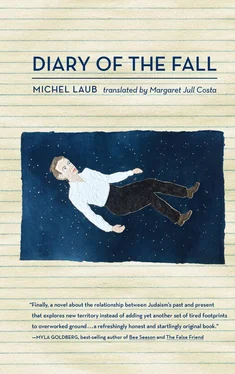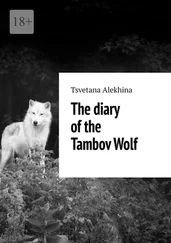12.
When I was thirteen I had still never had a girlfriend. I had never been really ill. I had never seen anyone die or have a serious accident. On the night that the birthday boy fell I dreamed about his father, about his aunts and uncles and grandparents, who had all been there, about his godfather, who had perhaps helped pay for the party, even though all they provided was chocolate cake and popcorn and chicken croquettes and paper plates.
13.
I often dreamed about the moment of the fall, a silence that lasted a second, possibly two, a room full of sixty people and no one making a sound, as if everyone were waiting for my classmate to cry out, or even just grunt, but he lay on the ground with his eyes closed until someone told everyone else to move away because he might be injured, a scene that stayed with me until he came back to school and crept along the corridors, wearing his orthopedic corset underneath his uniform in the cold, the heat, the sun and the rain.
14.
If, at the time, someone had asked me what affected me most deeply, seeing what happened to my classmate or the fact that my grandfather had been imprisoned in Auschwitz, and by “affect” I mean to experience something intensely as palpable and ever present, a memory that doesn’t even need to be evoked to appear, I would have had no hesitation in giving my answer.
15.
My grandfather died when my father was fourteen. The image I have of him comes from half a dozen photographs, in which he is always wearing the same clothes, the same dark suit, the same hair and beard, and I have no idea what his voice sounded like, and I don’t even know if his teeth were white because in none of the photos is he smiling.
16.
I never knew my grandfather’s house, but some of the furniture from there, the armchair, the round table, the glass cabinet, ended up in the apartment where my grandmother went to live afterward. It was an apartment better suited to a widow who rarely went out, at most once a week to have tea at a friend’s house, a habit she kept up until the friend had to move into an old people’s home, where she spent five or ten years, during which time she broke a leg and then her pelvis and suffered at least three bouts of pneumonia, a heart attack and a stroke before she died.
17.
I once visited that home with my grandmother. It was right on the outskirts of the city. The rooms smelled of eucalyptus, and the building was surrounded by a green area with benches and flower beds, and from there we could see the nurses, the visiting relatives, the occasional uniformed care assistant, and sometimes a gentleman in a motorized wheelchair equipped with an oxygen cylinder. My grandmother and her friend discussed the latest TV soap, the violence reported in the newspapers, how people in the street were growing ever ruder and the cold days ever longer, and at no point in the conversation, nor in any conversation I had with my grandmother until she died, more or less as her friend in the home had done, except without a heart attack along the way, and the stroke she had was so massive that it spared everyone having to see her lying in bed during that eternity in which the person can neither speak nor move — at no point in her life did my grandmother mention my grandfather.
18.
I mean, sometimes she would say very obvious things, that my grandfather didn’t talk much, that he slept in long-sleeved pajamas even in summer, that when they were first married he would do fifteen minutes of exercises when he got up, and that he once fell off the ladder he would use to get into the loft, and I could continue that list until there were twenty items or perhaps even thirty, but at no point in all those years did she tell me the most important thing about him.
19.
In the final years of his life, my grandfather spent the whole day in his study. Only after he died did we find out what he had been doing there, notebooks and more notebooks filled with tiny writing, and only when I read what he had written did I finally understand what he had been through. It was then that his experience stopped being merely historical, merely collective, merely attached to some abstract moral, in the sense that Auschwitz became a kind of landmark in which you believe with all the force of your education, your reading, all the debates you’ve heard on the subject, the positions you’ve solemnly defended, the vehemently condemnatory statements you’ve made without for a second feeling as if any of that experience were truly yours.
20.
If I had to speak about something that was truly mine, I would start with the story of that classmate who fell at the party. About how he reappeared at school months later. About how I found the courage to go over to him and speak and ask a question when the two of us were waiting in the corridor for the next class and make some comment regarding the following week’s test or the teacher’s dandruff-covered jacket, and about the way in which he responded to my comment, as if we were having a perfectly normal conversation and as if either of us could possibly forget that he was wearing an orthopedic corset, and that whenever he stood up it felt as if everyone were watching to see if he walked any differently, raising one foot higher than the other, a slightly irregular rhythm that would stay with him forever, as it would with the other boys who were there at that party.
21.
My classmate’s name was João, and as we grew closer I learned that: (a) his father sold cotton candy in the park because he didn’t earn enough as a bus conductor; (b) his father had brought him up alone because João’s mother had died before she was forty; (c) after his mother died, his father never married again or had more children or even a girlfriend.
22.
About João I learned that: (a) he never said anything to his father about getting buried in sand every day; (b) he told him that the reason he never phoned up a friend to go out to play was because he preferred to stay at home studying; (c) he never attributed any of his problems at school to the fact that he wasn’t Jewish.
23.
My school had a tradition of getting students into the best universities, the ones that produced industrialists, engineers and lawyers. João’s father thought it was worth the sacrifice to enroll João in such a prestigious school, and through the scholarship program he managed to get an 80 percent discount on the monthly fees. However, he still had to work really hard to pay the remaining 20 percent, plus the uniform, books and transport.
24.
João’s father decided to celebrate his son’s thirteenth birthday because the family had never given a proper party. Aside from birthdays when João was a child, they usually only invited relatives over for a beer, and João didn’t normally invite anyone apart from a cousin and a boy from the same building who was four years younger than him. But because João was attending a Jewish school and all the boys there were bar mitzvahed at the age of thirteen, and at every party the birthday boy was given thirteen bumps, a kind of initiation into the adult world, when, to use the Hebrew expression that gives the ceremony its name, the boy became “a son of commandment,” for all those reasons João’s father persuaded his son to invite his classmates to the reception room in the building where one of his brothers-in-law lived.
25.
I only found this out months later, when I was already a regular visitor to their apartment. They lived in an even more modest building than the brother-in-law, a place of peeling walls and bare wires, and when I arrived there one afternoon, quite late in the day, João was out. He had gone to pay a bill or post a letter or take something to the registry office, one of the various errands he ran in order to help out at home, and his father opened the door to me and offered me a glass of fruit juice. We sat down in front of the TV. The local news was on. We sat there for some time, not saying anything, as was perfectly normal, because up until then I had never exchanged more than a few words with him, and when the silence became ever more uncomfortable and the daily soap ever more tedious, and because it was nearly dark and João had still not come back, he started asking me questions — about school, about my father, about my grandfather.
Читать дальше












